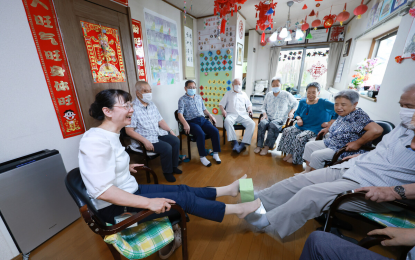TOKOROZAWA, Saitama Prefecture – Japanese war orphans left behind in China amid the turmoil at the end of World War II and repatriated to Japan decades later are now entering old age.
Many struggle to adapt to conventional nursing homes because of language barriers. To meet their needs, Mariko Kamijo, 47, the eldest daughter of a repatriated orphan, has opened a nursing care facility that provides support in Chinese.
One day at Isshoen, a nursing care facility in Tokorozawa, Saitama Prefecture, eastern Japan, 10 clients took part in light exercises and recreational activities, occasionally chanting, "Yi, er, san, si," meaning one, two, three, four in Chinese. Much of the conversation in the room was in Chinese, as well.
More than half of the roughly 30 people who use the facility, including spouses, are Japanese who went to China as children during the war, when parts of the country were under Japanese control, and were later left behind there. Some speak little or no Japanese. "I treat them as if they were my own parents," says Kamijo, who addresses them in Chinese.
She was inspired to start the nursing care business after learning about the experiences of her father, Mitsuhiko, 87, who was left behind in China at the age of 7.
The term "Japanese war orphans left behind in China" refers to children, mostly under the age of 13, who were separated from their families in former Manchuria and other parts of China and taken in by Chinese families after the Soviet Union entered the war against Japan in August 1945 in violation of its bilateral neutrality pact.
Mitsuhiko was born in 1938 in Nagano Prefecture, central Japan, and spent parts of his childhood in Beijing and elsewhere in China. After the war, while staying with relatives in what was then Manchuria in northeastern China, he was lured by someone who promised a meeting with his parents and was taken to the home of a blind Chinese man who later adopted him. Mitsuhiko recalls that he "became his eyes," speaking through his daughter as interpreter.
Unable to attend school, he began working young, apprenticing as a barber at 13. He says in tears that he always wanted to return to Japan.
Efforts to locate the left-behind orphans’ Japanese relatives gained momentum in 1981, when surveys and government-supported visits to Japan began.
Around 1983, Mitsuhiko began searching for his family by contacting the Japanese Embassy in Beijing. He had forgotten Japanese and could not recall his full Japanese name or date of birth. Even so, fragments of memory–a surname that included "Kami," childhood play at Lake Suwa in Nagano, and a younger sister with a burn on one of her arms–led to a breakthrough. In the summer of 1985, his elder brother, who had been searching for him for years, finally tracked him down in Japan.
During a visit to Japan the following year, Mitsuhiko was reunited with his parents and other relatives. He says he could not put his joy into words. In October 1995, he moved to Japan with three family members. He was 57, and his eldest daughter was 17.
About two months later, Mitsuhiko suffered a cerebral hemorrhage that left him with physical disabilities. Around the age of 70, he began to require nursing care and started using day care services.
One day, Mitsuhiko confided in his family about an incident at the care facility where he was receiving care. During bath time, he had been left undressed. Shivering in the cold, he could not call for help because he did not understand Japanese.
After hearing Mitsuhiko’s tearful admission that the war had "upended"






